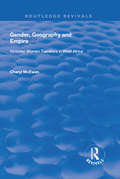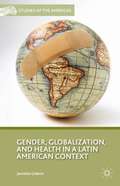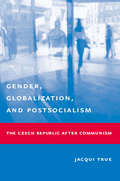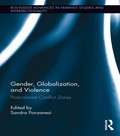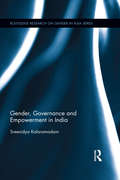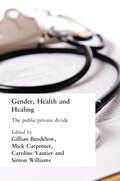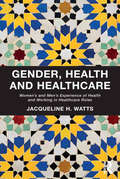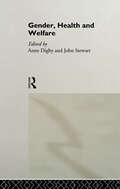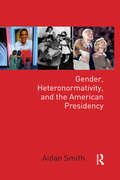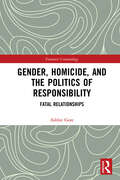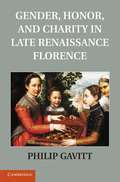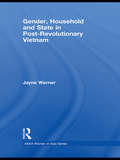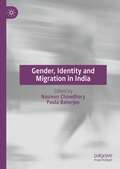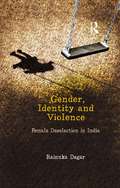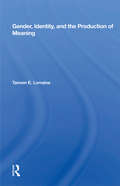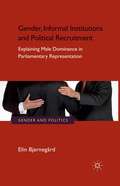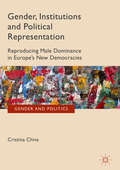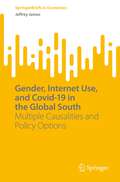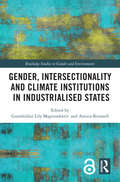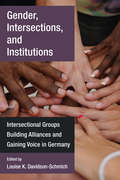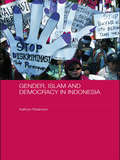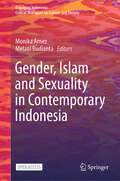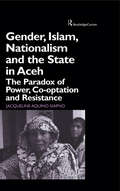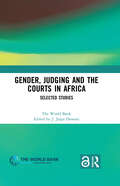- Table View
- List View
Gender, Geography and Empire: Victorian Women Travellers in Africa
by Cheryl McEwanThis title was first published 2000: This text is intended to draw together two important developments in contemporary geography: firstly, the recognition of the need to write critical histories of geographical thought and, particularly, the relationship between modern geography and European imperialism; and secondly, the attempt by feminist geographers to countervail the absence of women in the histories. The author focuses on the narratives of British women travellers in West Africa between 1840 and 1915, exploring their contributions to British imperial culture, teh ways in which they wer empowered in the imperial context by virtue of both "race" and class, and their various representations of West African landscapes and peoples. The book argues for the inclusion of women and their experiences in histories of geographical thought and explores the possibilities and problems of combining feminist and post-colonial approaches to these histories.
Gender, Globalization, And Health In A Latin American Context
by Jasmine GideonUsing a political economy of health, this book examines the linkages between gender, globalization, and health in a Latin American context.
Gender, Globalization, and Postsocialism: The Czech Republic After Communism
by Jacqui TrueTrue examines political and gendered identities in flux in post-communist Czech Republic. She argues that the privatization of a formerly state economy and the adoption of consumer-oriented market practices were shaped by ideas and attitudes about gender roles. This book also offers a provocative general thesis about the inextricable linkages between political and economic changes and gender identities.
Gender, Globalization, and Postsocialism: The Czech Republic After Communism
by Jacqui TrueHow are changing gender relations shaping and being shaped by post-socialist marketization and liberalization? Do new forms of economic and cultural globalization open spaces for women's empowerment and feminist politics? The rapid social transformations experienced by the people of the Czech Republic in the wake of the collapse of communism in 1989 afford political scientist Jacqui True with an opportunity to answer these questions by examining political and gendered identities in flux. She argues that the privatization of a formerly state economy and the adoption of consumer-oriented market practices were shaped by ideas and attitudes about gender roles.Though finely tuned to the particular, local traditions that have defined the boundaries of globalization for Czech men and women, Gender, Globalization, and Postsocialism also offers a provocative general thesis about the inextricable linkages between political and economic changes and gender identities.
Gender, Globalization, and Violence: Postcolonial Conflict Zones (Routledge Advances in Feminist Studies and Intersectionality #17)
by Sandra PonzanesiThis wide-ranging collection of essays elaborates on some of the most pressing issues in contemporary postcolonial society in their transition from conflict and contestation to dialogue and resolution. It explores from new angles questions of violent conflict, forced migration, trafficking and deportation, human rights, citizenship, transitional justice and cosmopolitanism. The volume focuses more specifically on the gendering of violence from a postcolonial perspective as it analyses unique cases that disrupt traditional visions of violence by including the history of empire and colony, and its legacies that continue to influence present-day configurations of gender, race, nationality, class and sexuality. Part One maps out the gendered and racialized contours of conflict zones, from war zones, prisons and refugee camps to peacekeeping missions and humanitarian aid, reframing the field and establishing connections between colonial legacies and postcolonial dynamics. Part Two explores how these conflict zones are played out not just outside but also within Europe, demonstrating that multicultural Europe is fraught with different legacies of violence and postcolonial melancholia. Part Three gives an idea of the kind of future that can be offered to post-conflict societies, defined as contact zones, by exploring opportunities for dialogue, restoration and reconciliation that can be envisaged from a gendered and postcolonial perspective through alternative feminist practices and the work of art and their redemptive power in mobilizing social change or increasing national healing processes. Though strongly anchored in postcolonial critique, the chapters draw from a range of traditions and expertise, including conflict studies, gender theory, visual studies, (new) media theory, sociology, race theory, international security studies and religion studies.
Gender, Governance and Empowerment in India (Routledge Research on Gender in Asia Series)
by Sreevidya KalaramadamSince the mid-1980s, the presence of women in governance has become a major marker of successful democracy in global and national discourses on the democratization of society. A diverse set of nation-states have legislatively mandated gender quotas to ensure the presence of elected women representatives (EWRs) in various rungs of governance. Since 1993, the Indian state has legislated a massive program of democratization and decentralization. As a result, more than 1.5 million EWRs have taken office within the lower rungs of governance or the Panchayati Raj Institutions (PRI). This book is an ethnography of the Indian state and its policy of legislated entry of women into political life. It argues that political participation of women is necessary to change the political practices in society, to make institutions more gender, class and caste representative, and to empower individual women to negotiate both formal and informal institutions. Its locus is the everyday life contexts of EWRs in the southern Indian state of Karnataka who negotiate their own meanings of politics, state, society, empowerment and political subjectivity. Analysing three factors – structural boundaries, sociocultural divisions and conjunctural limitations imposed on the participation of EWRs by political parties – the book demonstrates that the social embeddedness of PRIs within everyday practices and social relations of identity and power severely constrain and shape the political participation and empowerment of EWRs. Providing a valuable insight into contemporary state and feminist praxis in India, this book will be of interest to scholars of grass-roots democracy, gender studies and Asian politics.
Gender, Health and Healing: The Public/Private Divide
by Gillian Bendelow, Mick Carpenter, Caroline Vautier and Simon WilliamsWhat do we mean by 'gender' and how does this relate to health?How is 'biology' best understood?What does a focus on the division of labour bring to our understanding of health work?Is (gender) 'equity' in health possible?How have developments such as the resurgence of emotions and the new genetics affected these and other social relations at the turn of the century?These are just some of the questions addressed in Gender, Health and Healing in which a whole range of issues are brought together and connected to emerging concerns in contemporary life such as the new genetics and transformations in biomedical knowledge and practices. It offers a challenging assessment of gender relations and embodied practices across the public/private divide, using health and healing as paradigmatic examples.This thought-provoking volume lies at the intersection of gender studies, the sociology of health and healing, health policy, the critical analysis of scientific knowledge and the current debates around the body, health and emotions. Bringing together new and leading scholars in the field, it provides a unique critical overview of contemporary debates in health care for an interdisciplinary readership.
Gender, Health and Healthcare: Women’s and Men’s Experience of Health and Working in Healthcare Roles
by Jacqueline H. WattsHealth status and the experience of working in health care roles are both strongly shaped by gender and, although there have been attempts to incorporate ’gender awareness’ in both health and employment policies, the significance of gender in these areas continues to be marginalised within public debates and academic discourses. Taking a social constructionist perspective, Watts considers the ways in which gender impacts upon health in all its elements including access, technology, professionalisation, health promotion and health as an important sector of the labour market. She discusses gender as a developing and diversified category, exploring ideas about masculinity and the fluidity of gender boundaries in determining individual identity. Chapters that follow discuss men’s and women’s health; ideology of gender and health, specifically exploring different social norms and ideas about male and female health and the dominant ideological association between femaleness and caring; working for health with particular focus on the gendered interplay of caring and curing roles; technology and changes to gender, health and healthcare; health promotion as a gendered activity and, finally, the importance of introducing an intersectional approach beyond gender to articulate a deeper understanding of health in a postmodern context. The concluding chapter draws together these themes to underscore the importance of placing gender at the centre of health and health care delivery to fully take account of both the different life and health experiences of men and women and the gendered dimensions of working in health care.
Gender, Health and Welfare
by Anne Digby John StewartGender, Health and Welfare deals primarily with the century before the creation of the classic welfare state in Britain. It provides a stimulating introduction to an historical era which saw a huge expansion in welfare services, both state and voluntary, and during which women emerged as significant 'consumers' and 'providers' of various measures.
Gender, Heteronormativity, and the American Presidency (Global Gender)
by Aidan SmithGender, Heteronormativity and the American Presidency places notions of gender at the center of its analysis of presidential campaign communications. Over the decades, an investment in gendered representations of would-be leaders has changed little, in spite of the second- and third-wave feminist movements. Modern candidates have worked vigorously to demonstrate "compensatory heterosexuality," an unquestionable normative identity that seeks to overcome challenges to their masculinity or femininity. The book draws from a wide range of archived media material, including televised films and advertisements, public debates and speeches, and candidate autobiographies. From the domestic ideals promoted by Eisenhower in the 1950s, right through to the explicit and divisive rhetoric associated with the Clinton/Trump race in 2016; intersectional content and discourse analysis reveals how each presidential candidate used his or her campaign to position themselves as a defender of traditional gender roles, and furthermore, how this investment in "appropriate" gender behaviour was made manifest in both international and domestic policy choices. This book represents a significant and timely contribution to the study of political communication. While communication during presidential elections is a well-established research field, Aidan Smith’s book is the first to apply a gendered lens over such an extended historical period and across the political spectrum.
Gender, Homicide, and the Politics of Responsibility: Fatal Relationships (Feminist Criminology)
by Ashlee GoreGender, Homicide, and the Politics of Responsibility explores the competing and contradictory understandings of violence against women and men’s responsibility. It situates these within the personal and political intersections of neoliberal and ‘postfeminist’ imperatives of individualisation, choice, and empowerment. As violence against women has become a national and international policy priority, feminist concerns about violence against women, and men’s responsibility, have entered the mainstream only to be articulated in politically contradictory ways. This book explores themes of responsibility for violence, and the social and legal consequences that men and women uniquely or differently encounter. By drawing on high-profile cases of homicide, an extensive literature on feminist perspectives on violence, and compelling focus group discussions, the book examines the politicised claims regarding the ‘responsibility’ of men and women as both victims and offenders in intimate relationships. Deploying a range of interdisciplinary approaches, it utilises a blend of cultural theory and psychosocial analysis to offer an account of the infiltration of postfeminist and neoliberal sensibilities of individualism and responsibilisation in the social, legal, and interpersonal imaginary. The book makes contributions to several fields, such as the current public policy initiatives to hold men accountable for violence against women; understanding public attitudes to violence against women; and contextualising the challenges faced by a number of feminist reforms that seek to address these issues. An accessible and compelling read, Gender, Homicide, and the Politics of Responsibility will appeal to students and scholars of criminology, sociology, gender studies and those interested in understanding the debates surrounding violence against women, violence by women, and the social construction of responsibility and responsibilisation.
Gender, Honor, and Charity in Late Renaissance Florence
by Philip GavittThis book examines the important social role of charitable institutions for women and children in late Renaissance Florence. Wars, social unrest, disease and growing economic inequality on the Italian peninsula displaced hundreds of thousands of families during this period. In order to handle the social crises generated by war, competition for social position and the abandonment of children, a series of private and public initiatives expanded existing charitable institutions and founded new ones. Philip Gavitt's research reveals the important role played by lineage ideology among Florence's elites in the use and manipulation of these charitable institutions in the often futile pursuit of economic and social stability. Considering families of all social levels, he argues that the pursuit of family wealth and prestige often worked at cross-purposes with the survival of the very families it was supposed to preserve.
Gender, Household and State in Post-Revolutionary Vietnam (ASAA Women in Asia Series)
by Jayne WernerThis book examines gender in post-revolutionary Vietnam, focusing on gender relations in the family and state since the onset of economic reform in 1986. Drawing on a wide range of primary sources (including surveys, interviews, and responses to film screenings), Jayne Werner demonstrates that despite the formal institution of public gender equality in Vietnam, in practice women do not hold a great deal of power, continuing to defer to men in both the family and the wider community. Contrary to conventional analyses equating liberalisation and decentralisation with a reduced role for the state over social relations, this book argues that gender relations continued to bear the imprint of state gender policies and discourses in the post-socialist state. While the household remained a highly statist sphere, the book also shows that the unequal status of men and women in the family was based on kinship ties that provided the underlying structure of the family and (contrary to resource theory) depended less on their economic contribution than on family norms and conceptions of proper gendered behaviour. Werner’s analysis explores the ways in which the Doi Moi state utilised constructions of gender to advance its own interests, just as the communist revolutionary regime had earlier used gender as a key strategic component of post-colonial government. Thus this book makes an important and original contribution to the study of gender in post-socialist countries.
Gender, Identity and Migration in India
by Nasreen Chowdhory Paula BanerjeeThe book focuses on voices of displaced women who constitute a critical part of the migration process through an unravelling of the engendered displacement. It draws attention to the various processes, methods and approaches by national and international human rights and humanitarian laws and principles, and the experiences of the relevant communities, organisations towards peaceful co-existence. The contributions to this volume embellish the argument that there is a direct correlation between an academic researcher's positionality, methods and trajectories of critical knowledge production. In particular, feminist epistemologies with specific emphasis on post-coloniality utilized in conjunction with scholarship related to transnational migration studies constitute a distinctly powerful vantage point for challenging methodological nationalism and the syndrome of 'seeing like the state' in the area of forced migration studies.
Gender, Identity and Violence: Female Deselection in India
by Rainuka DagarThe missing girls in India are not a new phenomenon. The British passed an Act to check female infanticide more than 100 years ago. Since 1960, India’s birth sex ratios have progressively declined from 994 to 910, implicating life-affecting gender violence. Backed by extensive field research, data and interviews, this book explores girl child deselection through cultural neglect, female infanticide and foeticide, and the role of caste and religion. The book spans critical socio-historical contexts and examines the practice of selective right to life. It views the effects of militancy and khaap panchayats, and studies women’s rights discourses and protective legal reforms. The gender imbalance is mapped globally and analysed in the specific conditions of the Indian states of Punjab and Haryana. The book examines the inter-linkages of gender hierarchies with male child preference and warns that theoretical analyses limited to female foeticide alone cannot address gender inequalities or change the cycle of violence. This will be valuable to scholars and researchers of gender and women studies, sociology, politics, and population and demographic studies. It will also be indispensable for women’s rights activists, NGOs, policy makers, government bodies, and those studying health and family planning.
Gender, Identity, And The Production Of Meaning
by Tamsin E. LorraineThis book explains an open-ended theory of self that delineates 'masculine' and 'feminine' self-strategies on the basis of the Hegelian tradition of theorizing self/other relations and contemporary feminist theory. It proposes the possibility of combining the gender differentiated self strategies.
Gender, Informal Institutions and Political Recruitment
by Elin Bjarneg�rdIn this book, men in politics are the subjects of a gendered analysis with Elin Bjarnegård exploring how male networks are maintained and expanded, seeking to improve our understanding of the rationale underlying male dominance in politics. The role of informal institutions in unpredictable political settings are explored.
Gender, Institutions and Political Representation
by Cristina ChivaThis book traces the struggles over the institutions of political representation in Central and Eastern Europe, focusing on the factors that have held women back over the post-communist period, as well as on the growing evidence for change throughout the region. Post-communist Europe has long raised two puzzles for scholars of women's representation in politics. First, why have women been under-represented in politics in every country in the region since communism's collapse? Secondly, why are there relatively few cases where women's advocates have been successful in pressing for change? This comparative study of Europe's new democracies argues that these puzzles are best understood as questions about male dominance - that is, about the mechanisms that sustain, or, alternatively, change long-established patterns of male over-representation in politics over time. The author covers six EU member states - Bulgaria, the Czech Republic, Hungary, Poland, Romania and Slovakia - during the period 1990-2016. The book will be of use to students and scholars in the fields of Comparative Politics, Democracy and Democratization, European Studies, Gender Studies, Post-Communist Studies, and Central and Eastern European Studies.
Gender, Internet Use, and Covid-19 in the Global South: Multiple Causalities and Policy Options (SpringerBriefs in Economics)
by Jeffrey JamesThis book analyzes the use of the mobile Internet against the background of gender bias and Covid-19, currently two of the most important and pressing problems of the Global South. The book argues that the degree of benefits from this new technology depends heavily on the way it is actually used and that most new technologies are developed for the conditions prevailing in rich countries, where they tend to be quite easily adopted and used. In the Global South, by contrast, a paucity of digital skills and other factors make the potentially valuable benefits from the Internet much more difficult to derive. Using empirical data recently provided by the Groupe Speciale Mobile Association (GSMA), the book examines the existence and extent of the digital divide between males and females in mobile Internet use, which constitutes a new form of divide. It sheds light on the acute difficulty for first-time mobile Internet users in the Global South, and especially Sub-Saharan Africa, to learn the digital skills that are needed to use the said technology effectively, with a special focus on how these users acquire the required knowledge, without having undergone the process of learning by doing. The book further discusses the determinants of digital skills in the Global South, as well as major factors underlying the extent to which different users actually benefit from the mobile Internet, such as gender, location, age, and education. Finally, it investigates how womens' use of the Internet has been altered by the pandemic in the Global South.This book will appeal to students, researchers, and scholars of development economics and development studies, as well as policy-makers interested in a better understanding of the impact of gender bias and Covid-19 on mobile internet use in the Global South.
Gender, Intersectionality and Climate Institutions in Industrialised States (Routledge Studies in Gender and Environments)
by Gunnhildur Lily Magnusdottir and Annica KronsellThis book explores how climate institutions in industrialized countries work to further the recognition of social differences and integrate this understanding in climate policy making. With contributions from a range of expert scholars in the field, this volume investigates policy-making in climate institutions from the perspective of power as it relates to gender. It also considers other intersecting social factors at different levels of governance, from the global to the local level and extending into climate-relevant sectors. The authors argue that a focus on climate institutions is important since they not only develop strategies and policies, they also (re)produce power relations, promote specific norms and values, and distribute resources. The chapters throughout draw on examples from various institutions including national ministries, transport and waste management authorities, and local authorities, as well as the European Union and the UNFCCC regime. Overall, this book demonstrates how feminist institutionalist theory and intersectionality approaches can contribute to an increased understanding of power relations and social differences in climate policy-making and in climate-relevant sectors in industrialized states. In doing so, it highlights the challenges of path dependencies, but also reveals opportunities for advancing gender equality, equity, and social justice. Gender, Intersectionality and Climate Institutions in Industrialized States will be of great interest to students and scholars of climate politics, international relations, gender studies and policy studies.
Gender, Intersections, and Institutions: Intersectional Groups Building Alliances and Gaining Voice in Germany
by Louise K Davidson-SchmichGermany serves as a case study of when and how members of intersectional groups—individuals belonging to two or more disadvantaged social categories—capture the attention of policymakers, and what happens when they do. This edited volume identifies three venues through which intersectional groups are able to form alliances and generate policy discussions regarding their concerns. Original empirical case studies focus on a wide range of timely subjects, including the intersexed, gender and disability rights, lesbian parenting, women working in STEM fields, workers’ rights in feminized sectors, women in combat, and Muslim women and girls.
Gender, Islam and Democracy in Indonesia (ASAA Women in Asia Series #6)
by Kathryn RobinsonThis book explores the relationship between gender, religion and political action in Indonesia, examining the patterns of gender orders that have prevailed in recent history, and demonstrating the different forms of social power this has afforded to women. It sets out the part played by women in the nationalist movement, and the role of the women’s movement in the structuring of the independent Indonesian state, the politics of the immediate post-independence period and the transition to the authoritarian New Order. It analyses in detail the gender relations of the New Order regime, focused around the unitary family form supposed by the family system expounded in the New Order ideology and the contradictory implications of the opening up of the economy to foreign capital and ideas, for gender relations. It examines the forms of political activism that were possible for the women’s movement under the New Order, and the role it played in the fall of Suharto and the transition to democracy. The relationship between Islam and women in Indonesia is also addressed, with particular focus on the way in which Islam became a critical focus for political dissent in the late New Order period. Overall, this book provides a thorough investigation of the relationship between gender, religion and democracy in Indonesia, and is a vital resource for students of gender studies and Indonesian affairs.
Gender, Islam and Sexuality in Contemporary Indonesia (Engaging Indonesia)
by Melani Budianta Monika ArnezThis Open Access book explores the complex interplay between gender, Islam and sexuality in Indonesia, the country with the world's largest Muslim population. The authors offer a fresh look at the tensions between the local and the global through a wide range of cultural expressions and productions, including fashion, Islamic dating, popular literature, and videos on YouTube. The book is grouped around three core themes: sexuality and violence, halal lifestyle, and shame and self-determination. The first section unpacks how activists and progressive religious scholars have argued for the need for the Sexual Violence Bill and it examines the ambivalence between criminalisation and care towards LGBTQ+ people. In the second, the authors bring new insights into how local expressions of Islam, gender and sexuality are negotiated in an increasingly globalised world. The contributions on the third theme tackle gender roles and mobility in culturally diverse regions such as Hong Kong,Taiwan, Singapore, the US, and Indonesia. "The volume is a must-read for anyone wanting to get up to speed on changes in Indonesia's gender, sexuality and Islamic landscape." - Professor Sharyn Graham Davies, Director of the Herb Feith Indonesia Engagement Centre, Monash University, Australia "A showcase of excellent research, this book is of appeal to Indonesian studies scholars, and to readers in the field of Asian cultural studies. It is also of relevance to the field of Asian gender and sexuality studies, and to scholars in Islamic studies." - Professor Pamela Nilan, University of Newcastle, Australia
Gender, Islam, Nationalism and the State in Aceh: The Paradox of Power, Co-optation and Resistance
by Jaqueline Aquino SiapnoThis book sets out to open up the space for interpretation of history and politics in Aceh which is now in a state of armed rebellion against the Indonesian government. It lays out a groundwork for analysing how female agency is constituted in Aceh, in a complex interplay of indigenous matrifocality, Islamic belief and practices, state terror, and political violence. Analysts of the current conflict in Aceh have tended to focus on present events. Siapno provides a historical analysis of power, co-optation, and resistance in Aceh and links it to broader comparative studies of gender, Islam, and the state in Muslim communities throughout the world.
Gender, Judging and the Courts in Africa: Selected Studies (Routledge Studies on Gender and Sexuality in Africa)
by J. Jarpa DawuniWomen judges are playing increasingly prominent roles in many African judiciaries, yet there remains very little comparative research on the subject. Drawing on extensive cross-national data and theoretical and empirical analysis, this book provides a timely and broad-ranging assessment of gender and judging in African judiciaries. Employing different theoretical approaches, the book investigates how women have fared within domestic African judiciaries as both actors and litigants. It explores how women negotiate multiple hierarchies to access the judiciary, and how gender-related issues are handled in courts. The chapters in the book provide policy, theoretical and practical prescriptions to the challenges identified, and offer recommendations for the future directions of gender and judging in the post-COVID-19 era, including the role of technology, artificial intelligence, social media, and institutional transformations that can help promote women’s rights. Bringing together specific cases from Kenya, Uganda, Ghana, Nigeria, Zambia, Tanzania, and South Africa and regional bodies such as ECOWAS and the African Commission on Human and Peoples’ Rights, and covering a broad range of thematic reflections, this book will be of interest to scholars, students, and practitioners of African law, judicial politics, judicial training, and gender studies. It will also be useful to bilateral and multilateral donor institutions financing gender-sensitive judicial reform programs, particularly in Africa.
